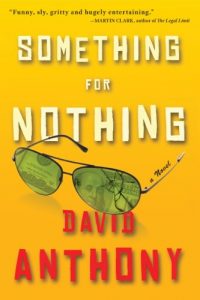GUEST COLUMNIST DAVID ANTHONY TALKS ABOUT FANTASIES OF TREASURE IN HIS NOVEL SOMETHING FOR NOTHING AND IN CONTEMPORARY AMERICAN NARRATIVE
 A short way into Cormac McCarthy’s novel No Country for Old Men (recreated so memorably by the Cohen Brothers), the protagonist Llewelyn is out hunting in the plains of southern Texas when he stumbles upon the aftermath of a shootout between rival drug gangs. There are bodies everywhere, and the one survivor is soon to die. But the really important discovery is a satchel full of money. Like a character in a fairy tale, Llewelyn opens the case, and finds unimaginable riches. Here is the key quote:
A short way into Cormac McCarthy’s novel No Country for Old Men (recreated so memorably by the Cohen Brothers), the protagonist Llewelyn is out hunting in the plains of southern Texas when he stumbles upon the aftermath of a shootout between rival drug gangs. There are bodies everywhere, and the one survivor is soon to die. But the really important discovery is a satchel full of money. Like a character in a fairy tale, Llewelyn opens the case, and finds unimaginable riches. Here is the key quote:
[H]e reached and unbuckled the two straps and unsnapped the brass latch and lifted the flap and folded it back. It was level full of hundred dollar banknotes. They were in packets fastened with banktape stamped each with the denomination $10,000. . . . He sat there looking at it and then he closed the flap and sat with his head down. His whole life was sitting there in front of him. Day after day from dawn till dark until he was dead. All of it cooked down into forty pounds of paper in a satchel.
 It’s easy to overlook how familiar this scene is, both in literature and film. Theodore Dreiser’s Sister Carrie, Scott Smith’s A Simple Plan, Robert Bloch and Hitchcock’s Psycho: these are but three of countless narratives in which we see characters suddenly in possession of unexpected caches of money. Sometimes these characters are devious criminal types, a la Walter White in the later seasons of Breaking Bad. But just as often they’re average people who, like Llewelyn in McCarthy’s novel, are down on their luck, and simply stumble upon found treasure. I would go so far as to say that this is a distinctly American narrative, one that stretches back to some of our earliest canonical writers—Edgar Allan Poe, Washington Irving, and Nathaniel Hawthorne all have stories in which characters locate stores of treasure.
It’s easy to overlook how familiar this scene is, both in literature and film. Theodore Dreiser’s Sister Carrie, Scott Smith’s A Simple Plan, Robert Bloch and Hitchcock’s Psycho: these are but three of countless narratives in which we see characters suddenly in possession of unexpected caches of money. Sometimes these characters are devious criminal types, a la Walter White in the later seasons of Breaking Bad. But just as often they’re average people who, like Llewelyn in McCarthy’s novel, are down on their luck, and simply stumble upon found treasure. I would go so far as to say that this is a distinctly American narrative, one that stretches back to some of our earliest canonical writers—Edgar Allan Poe, Washington Irving, and Nathaniel Hawthorne all have stories in which characters locate stores of treasure.
In fact, I would argue that this is a kind of ur-narrative in the American psyche, one that reflects our culture’s obsession with the fraught relationship between ourselves and our money. Because what these moments offer is the fantasy of finding money rather than having to earn it. Even bank robbery narratives offer this form of psychic satisfaction. This is why, for example, the real life John Dillinger was received as a kind of folk hero in the Midwest; movie theater crowds cheered when newsreels detailed his exploits. He, like the two financially-strapped thieves in a recent film Hell or High Water, spoke to a longing for a moment that precedes a more complicated and competitive world where one is either a “success” or a “failure” (or a “loser,” as our current president might put it). In this earlier world, one where you can actually find treasure, one’s fate is ruled by luck and providence, rather than by the invisible and often cruel hand of the market.
This, I think, is why Llewelyn takes the cash in No Country for Old Men, and why Marion Crane drives off with the money in Psycho—they want to escape the invisible hand of capitalism. And certainly this is what I had in mind when I wrote my own novel, Something for Nothing. The book is set in 1974 California, at the height of the Arab Oil Embargo. The economy is crashing, and my protagonist, a man named Martin Anderson, is desperate to pay his debts and keep his small craft airplane business—he sells used Cessnas and Cherokees—from going under. Accordingly, he accepts an offer he can’t refuse to use his planes to smuggle heroin up from Mexico. So certainly the story is an effort to imagine the fraught psychology of the American male in freefall—in many ways he’s like Jerry Lundegaard in Fargo, or Walter White in Breaking Bad. Or he’s like so many of us today, struggling to make it in an America where the one percent rule with open disdain for the rest of us. In addition to flying drugs up from Mexico, Martin lies habitually, he sneaks into his neighbor’s home to steal little keepsakes from the woman who lives there, and he buries money in the orchard behind his neighborhood. And when he’s not behaving strangely (or poorly), he’s drifting in and out of a fantasy world, one often informed by the narratives of popular culture: films such as The French Connection and West World; TV shows such as Bonanza; and the successes of the Oakland A’s, whose team captain, Sal Bando, just happens to live in his neighborhood.
But for me the key moment for Martin comes when, after a double-cross goes wrong, he unexpectedly gets his hands on the drug money, and realizes he can keep it for himself. Here is a short quote from late in the novel:
He could see the outline of the blocks of money through the green plastic garbage bag. . . . He squatted down, untied the little plastic strip that had been used to seal up the bag, and glanced inside. . . . It was a lot of money. Bill after bill after bill, all stacked up and (or so it seemed to Martin) all eager to be spent out in the world—eager to move in and out of cash registers and bank vaults, and just generally enter into circulation. Enough time in the dragon’s lair. Time to become capital.
Like so many protagonists before him, Martin has managed at this moment to evade the far-reaching and scary grip of global capitalism. Yes, he’s done stupid, desperate things—he’s a bit of a loser. But, like Jack at the top of the beanstalk, he has unexpectedly and against all odds found the treasure that might just enable him to survive.
On the other hand, unlike the protagonists of fairy tales, Martin doesn’t find actual gold. Instead, he finds paper money. And I think that’s an importance difference. In today’s money-driven American stories, characters like Martin and Llewelyn and Walter White do indeed get their hands on large amounts of money. But because it’s made of paper rather than gold, it’s a different kind of treasure. We might call it “postmodern” treasure. Unlike the gold eggs that Jack finds at the top of the beanstalk, this money isn’t inherently valuable. Worse, it’s ephemeral—it seems to vanish as quickly as it came. In the above quote from No Country for Old Men, we’re told that Llewelyn’s life is “cooked down into forty pounds of paper in a satchel.” That’s not necessarily a good thing. In Psycho, Marion Crane is murdered, and she and her stolen $40,000 disappear into a bog behind the Bates Motel. I don’t want to say what happens to Martin and his money by the end of Something for Nothing. But suffice it to say that, while he does indeed get his hands on the money he has coveted, luck is fickle. And in the long run, in the world of modern capitalism embodied so fittingly and depressingly by Donald Trump, that might make all the difference.
~~~
 David Anthony is an Associate Professor in the Department of English at SIUC. His research for the past ten years or so has revolved around the related representations of manhood and money in antebellum mass culture. His book, Paper Money Men: Commerce, Manhood, and the Sensational Public Sphere in Antebellum America, was published by Ohio State University Press in the Fall of 2009. He has also published essays on this issue in journals such as American Literature (2004 and 1997), The Yale Journal of Criticism (1999) and Early American Literature (2005), and has received research fellowships for this work from the American Antiquarian Society (1997; 2000; 2005), the Library Company of Philadelphia (2000), and SIUC (2000).
David Anthony is an Associate Professor in the Department of English at SIUC. His research for the past ten years or so has revolved around the related representations of manhood and money in antebellum mass culture. His book, Paper Money Men: Commerce, Manhood, and the Sensational Public Sphere in Antebellum America, was published by Ohio State University Press in the Fall of 2009. He has also published essays on this issue in journals such as American Literature (2004 and 1997), The Yale Journal of Criticism (1999) and Early American Literature (2005), and has received research fellowships for this work from the American Antiquarian Society (1997; 2000; 2005), the Library Company of Philadelphia (2000), and SIUC (2000).
A new project, tentatively entitled “The Sensational Jew in Early America,” is emerging from the above book. Here Anthony examines the many ways in which the Jew acted as the figure through which the white middle-class Gentile culture of the antebellum period sought to imagine its relationship to money, property, race, and sexuality. Chapters include studies of narratives about the “Jessica” character in American sensationalism (i.e. stories that reinvent Shylock’s daughter from Merchant of Venice); narratives about Jews and abducted or orphaned children (i.e. reinventions of Oliver Twist); and narratives about Jews, slavery, and the American South.
Anthony’s novel Something for Nothing was published by Algonquin books in June, 2011. Below is a blurb from Algonquin’s Spring 2011 catalog, in which the discerning reader will see links between Anthony’s critical work and his fiction: “Set in Northern California during the 1974 oil embargo, Something for Nothing traces the desperate efforts of Martin Anderson to save his failing small aircraft business—and with it an extravagant lifestyle that includes race horses, a deep-sea fishing boat, a cabin in Lake Tahoe, and an expensive suburban home—by flying heroin up from Mexico. But things quickly unravel: a narcotics detective enters the picture, the people in the drug world prove less than trustworthy, and Anderson’s domestic life begins to break apart. Longing for security and happiness even as he remains blind to the requirements for such rewards, Anderson thus becomes a figure for America’s own anxiety and denial during this period of economic downturn.”
Gary Garth McCann
First-prize winner for short works and for suspense/mystery, Maryland Writers’ Association, Gary Garth McCann is the author of the novella Young and in Love? and of the novels The Shape of the Earth and The Man Who Asked To Be Killed, praised at the Washington Independent Review of Books. His most recent published stories are available online in Chelsea Station Magazine, Erotic Review Magazine, and in Mobius: The Journal of Social Change. His other stories appear in The Q Review, reprinted in Off the Rocks, in Best Gay Love Stories 2005, and in the Harrington Gay Men’s Fiction Quarterly. See his blogs at garygarthmccann.com and streamlinermemories.com.
- Web |
- More Posts(57)